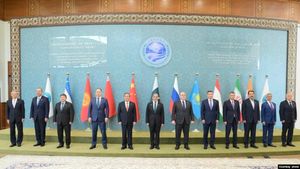Chinese mining powerhouse CMOC Group, also known as China Molybdenum, has recently celebrated hitting its annual cobalt production target, remarkably three months early. On the surface, this achievement might seem promising, especially since cobalt is integral to the battery technologies fueling the electric vehicle (EV) revolution. Yet, beneath this facade of success lies troubling news for the cobalt market, which is currently plagued by its lowest price levels seen over the past eight years.
According to CMOC’s third-quarter earnings report, the company reported cobalt production of 84,722 tons from its mainly African operations through September 2024. This production figure is astonishingly up 127% compared to the same period last year and greatly surpasses their previously stated annual forecast of 60,000 to 70,000 tons. One would expect such production levels to correlate with increased demand, but the cobalt market is experiencing just the opposite.
The price for cobalt has been trending downward due to many factors, including oversupply, fluctuated demand from the EV sector, and changing consumer preferences. This situation leaves many analysts scratching their heads at CMOC’s aggressive production strategy, especially at such low pricing levels. Some experts suggest CMOC is trying to corner the market and dictate prices to regain profitability. Yet, it raises the question: can they sustain this production level without profitability?
Deep-seated political dynamics and economic factors also come to play amid these cobalt production changes. China's relations with African nations, particularly the Democratic Republic of the Congo (DRC)—home to more than 70% of the world’s cobalt supply—remain integral. Recent reports indicate the DRC is beginning to press for renegotiation of foreign mining contracts as it seeks to reclaim more of the value generated from its mineral wealth.
President Felix Tshisekedi of the DRC has promised to thoroughly review foreign agreements and has initiated investigations particularly targeting China Molybdenum. These investigations could directly impact Chinese mining operations and the broader cobalt supply chain, possibly setting off ripples throughout the global market.
With these tensions brewing, companies like CMOC may find themselves walking a tightrope, balancing production goals with geopolitical realities. The future may see them having to recalibrate their strategies as they navigate the shifting sands of international relations.
Global demand for cobalt is primarily driven by the explosive growth of electric vehicles. Yet, there’s evidence of slowing demand due to market saturation and the increasing availability of substitutes for cobalt, such as nickel and lithium. According to analysts, this could mean CMOC’s record production levels might become inconsequential against the backdrop of declining prices and stagnant demand.
Meanwhile, the broader global economy remains uneasy, especially as China's economy itself shows signs of slowing down. Industries depending heavily on Chinese manufacturing face uncertainty as consumer spending decreases. This change could have downstream impacts on commodities like cobalt, as global supply chains reevaluate their reliance on the Chinese market.
Politically, such dynamics also influence the international perception of cobalt production in Africa, especially as Western countries begin to shift their focus on sustainable and ethical sourcing of materials necessary for technology and energy transitions. Given the environmental concerns and labor issues tied to cobalt mining practices, increasing scrutiny amplifies challenges for Chinese companies operating within Africa.
CMOC's swift production growth raises questions about labor conditions and environmental sustainability as industries worldwide call for more ethical sourcing. Issues surrounding workers' rights, health risks, and environmental degradation are increasingly gaining traction as consumers and investors advocate for accountability from corporations, leading to potential reputational risks for CMOC and similar entities.
Looking to the future, the interplay between production strategies, market demand, and geopolitical relations will be key to predicting cobalt’s role—along with the associated economic consequences—within the global economy. With CMOC pushing cobalt output, they must adhere to stricter labor and environmental standards, lest they face backlash from global consumers and competition from more ethically sourced materials.
Unmistakably, the path forward for cobalt will necessitate balancing aggressive production ambitions against fluctuated market demand and local geopolitical climates as the global focus on sustainability intensifies. We may not know yet if CMOC's strategy of increasing cobalt supply can successfully wrestle the market back to stable profitability, but they are clearly betting on being able to steer through these turbulent waters.



